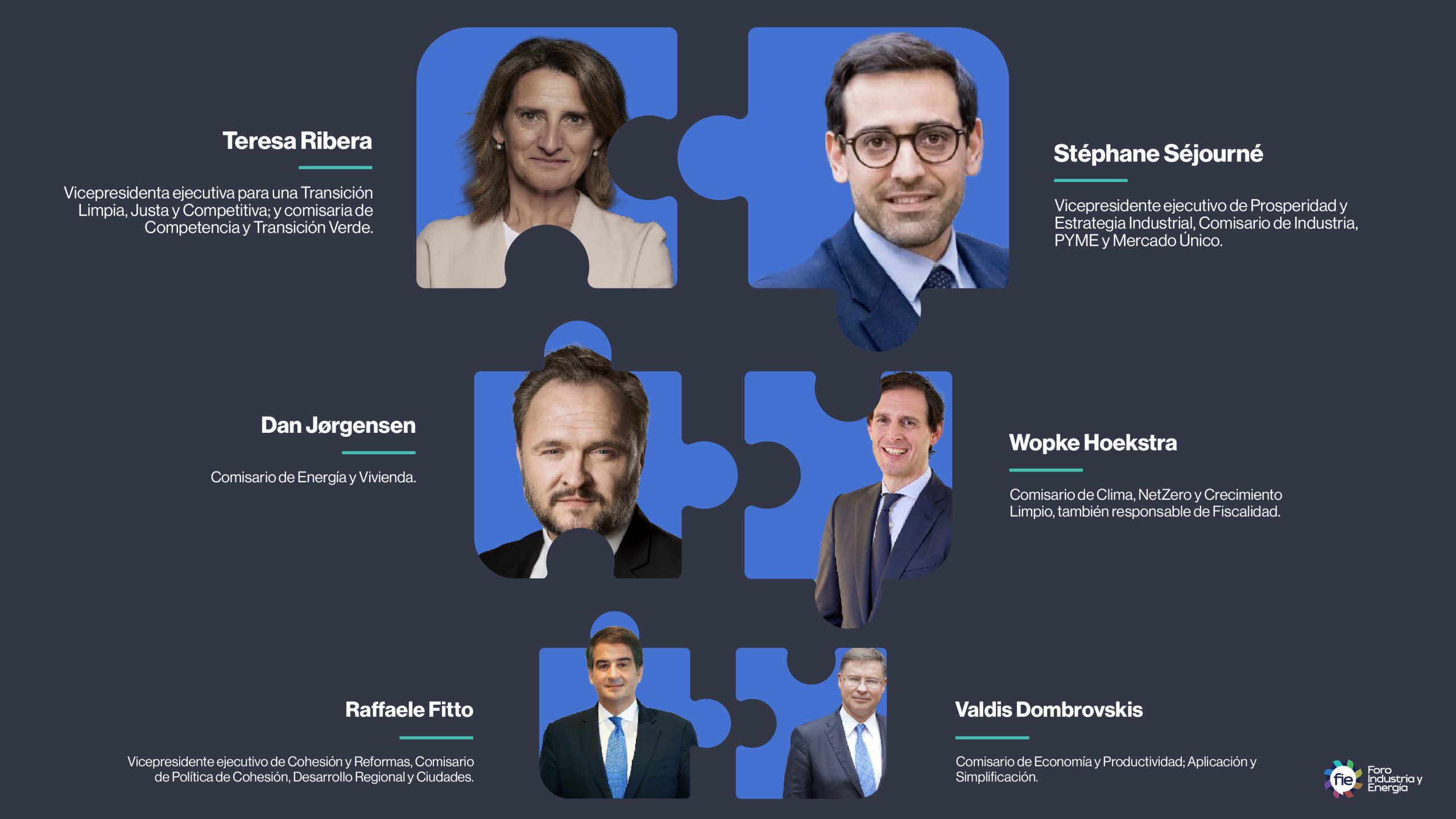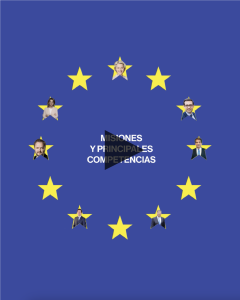Ursula Von der Leyen presented this week to the College of Commissioners, who will form the community executive for the next 5 years.
In this executive, which will have 6 vice-presidents and 26 commissioners, economic policies, especially industry and energy, overlap with environmental policies. This formula of interconnected areas will require all members of the European Union Government to work together so that Europe regains its weight in the global economy while advancing climate goals.
The backbone of industrial and energy policies will be the Clean Industrial Deal, aimed at directing investment towards infrastructure and industry, particularly in energy-intensive sectors, in order to support the EU’s industrial decarbonization, growth, and competitiveness goals. This major clean industry pact, which must take shape within the first 100 days of the mandate, will arise from the joint work of vice presidents and commissioners.
One of the most notable aspects of the four key figures in charge of the energy management of industry is that they are characterized by a certain social-democratic and environmentalist inclination, where photovoltaic, wind, and green hydrogen renewable energies prevail over others.
Thus, the door opens to a new Commission defined by its commitment to competitive sustainability focused on electrification.
Below, we highlight the responsibilities of the various members of the Commission directly or indirectly related to the energy management of industry.
Teresa Ribera: Executive Vice President for a Clean, Fair, and Competitive Transition and Commissioner for Competition and Green Transition.
According to Von der Leyen, “as Commissioner for Competition, she will lead efforts to steer Europe towards the goals of the Green Deal and simultaneously decarbonize and industrialize the economy.”
The goals she will need to achieve during her mandate, according to the EC Mission Letters, will include:
Energy and Industry:
- Create a scenario that fosters investment in innovation.
- Protect consumers from price increases and low-quality goods and services.
- Align with the objectives of the European Green Deal.
- Work with the Commissioner for Industry and the Net Zero Commissioner to create the Clean Industrial Deal.
- Develop a new state aid mechanism to accelerate renewables, industrial decarbonization, and ensure the manufacturing capacity of clean technology, avoiding market failures and inefficiencies in public management.
- Work to reduce energy prices and dependency on fossil fuels, in collaboration with the Commissioner for Energy.
- Ensure the transition benefits the population and helps drive the economy and industry.
- Coordinate taxation to support the transition and decarbonization.
- Coordinate with the Net Zero Commissioner.
In addition to her direct responsibilities related to the Transition, Teresa Ribera will also have other responsibilities in her area as Commissioner for Competition that indirectly influence the energy management of industry. Some of these are:
Competition:
- Develop a new approach to competition policy that supports the growth of European companies in global markets and benefits consumers.
- Implement a competition policy that reflects the importance of resilience in a volatile geopolitical context and considers other challenges such as supply chain threats and unfair competition.
- Create a new system of concentration analysis, modernizing competition policy by reviewing current methods for controlling horizontal mergers.
- Simplify state aid.
- Implement the European Competitiveness Fund to ensure consistency between the Fund and state aid policy. Work with member states on proposals for important projects of common European interest (IPCEIs) for strategic and technological sectors.
- Strengthen and promote the adoption of competition rules in cooperation with member states.
- Enforce regulations on foreign subsidies that distort the internal market. Combat anti-competitive practices.
Stéphane Séjourné: Executive Vice President for Prosperity and Industrial Strategy, Commissioner for Industry, SMEs, and Single Market.
Missions:
-
- Focus on decarbonization, clean technologies, and investment incentives.
- Build a regulatory framework conducive to growth that helps industry innovate and achieve economies of scale.
- Build Clean Transition Dialogues with stakeholders.
- Improve coordination through a Competitive Coordination Tool.
- Develop a new industrial policy that offers greater coordination, more investment, and a bolder use of the Internal Market and trade and economic policies, so that businesses and industries can compete in the global market.
- Present the Industrial Decarbonization Accelerator Act.
- Lead the implementation of the Net Zero Industry Act.
- Develop a European Competitiveness Fund in collaboration with Teresa Ribera.
- Lead the development of IPCEI (Important Project of Common European Interest).
- Work on risk absorption measures and continue implementing the InvestEU program.
- Review public procurement directives to ensure supply security in essential technologies and products while reducing administrative rules and bureaucracy.
- Develop a horizontal single market strategy.
- Lead work on critical raw materials. Develop a critical raw materials platform and implement the Critical Raw Materials Act.
- Develop an action plan for metals and steel.
- Enforce regulations on foreign subsidies that distort the internal market.
- Simplify and accelerate policy action to ensure the Single Market benefits businesses and innovation, to drive prosperity and address fragmentation and other barriers. Make the rules easy to implement.
- Establish innovation and research as a pillar of action.
- Ensure trade and economic security policies allow businesses to benefit from global markets and improve European competitiveness.
- Work on implementing the Carbon Border Adjustment Mechanism.
Dan Jørgensen: Commissioner for Energy and Housing
Missions:
- Complete a solid Energy Union, as the secure supply of clean and affordable energy is essential for European competitiveness and security, as well as for our decarbonization efforts towards 2030 and climate neutrality by mid-century.
- Reduce energy prices for households and businesses, produce more clean energy, modernize our grid infrastructure, and develop a resilient, interconnected, and secure energy system.
- Make energy a fundamental pillar of industrial strategy, promoting renewable energy, energy efficiency, attracting investments for the energy transition, and reinforcing energy security and technological neutrality.
- Develop an Electrification Plan with locally produced clean electricity.
- Launch a strategy to unlock private investment in clean energy infrastructure, including grids, storage and transport infrastructure, cross-border energy infrastructure, energy efficiency measures, the digitalization of the energy system, and the deployment of a hydrogen network.
- Develop a legal framework to upgrade and expand grids to support rapid electrification, accelerate permit granting.
- Design a plan to accelerate the development and deployment of small nuclear reactors in Europe during the 2030s.
- Together with the Climate, NetZero, and Clean Growth Commissioner, create a framework to reduce and phase out the use of fossil fuel subsidies and reduce Europe’s dependencies.
- Create a strategic roadmap for the digitalization and artificial intelligence in the energy sector.
- Implement an Energy Price Affordability Action Plan to lower prices for households and businesses and support industries and companies during the transition.
- Monitor the evaluation of the National Energy and Climate Plans.
- Update and simplify the current governance of the Energy Union, along with the Climate, NetZero, and Clean Growth Commissioner.
- Provide the energy dimension of the Clean Industrial Deal to unlock all possible decarbonization pathways for our industries.
Wopke Hoekstra: Commissioner for Climate, NetZero, and Clean Growth, also responsible for Taxation.
Missions:
- Advance the Energy Taxation Directive as part of a new fiscal system that plays a crucial role in supporting competitiveness.
- Oversee the National Energy and Climate Plans.
- Enshrine the 90% emissions reduction target for 2040 in our European Climate Law and the post-2030 strategy while supporting the competitiveness of European industry.
- Develop, together with the Executive Vice President for Prosperity and Industrial Strategy, the Clean Industrial Deal and the Industrial Decarbonization Accelerator Act.
- Create an Innovation Fund to invest in highly innovative clean technologies and flagship projects with European added value. Its goal is to channel investment towards Europe’s zero-emissions infrastructure, industrial decarbonization, and a more circular economy, particularly for energy-intensive sectors, as well as the EU value chains for clean technology manufacturing.
- Ensure the implementation of ETS2.
- Accelerate the creation of a Single Market for CO2.
- Ensure climate policy instruments continue to provide economic incentives for private investments in decarbonization.
- Together with the Commissioner for Energy, reduce and phase out the use of fossil fuel subsidies to reduce Europe’s dependencies.
- Represent the EU at the COP29 climate summit to be held in Azerbaijan in November.
Valdis Dombrovskis: Commissioner for Economy and Productivity; Implementation and Simplification.
Missions:
- Ensure policy coherence between the EU and national levels through the European Semester, the revised economic governance framework, and the current and future long-term EU budget. Ensure that the tax system plays a crucial role in supporting decarbonization and Europe’s competitiveness while ensuring social fairness.
- Lead the work, together with the Executive Vice President for Cohesion and Reforms, on the successful implementation of NextGenerationEU until its completion.
- Coordinate policies in favor of competitiveness, sustainability, and social justice. Externally represent the Commission’s work on the Semester and work with member states to monitor progress. Continue integrating the United Nations Sustainable Development Goals into the European Semester.
- Develop a new competitive coordination tool, as proposed in the Draghi report, which will work in conjunction with the future European Competitiveness Fund.
Raffaele Fitto: Executive Vice President for Cohesion and Reforms, Commissioner for Cohesion Policy, Regional Development, and Cities.
Missions:
- Lead the work, together with the Commissioner for Economy and Productivity; Implementation and Simplification, on the successful implementation of NextGenerationEU until its completion.


